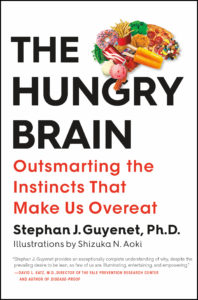Each year, US News & World Report publishes diet rankings based on the opinions of a panel of experts. This year, I served on the panel. In this post, I’ll discuss my general thoughts on the rankings, as well as the fact that the popular ketogenic diet tied for last place among the 40 diets.
Where the praties grow: My seven-day potato diet experiment
I recently finished the book Potato: A history of the propitious esculent. In it, John Reader takes his audience on a meandering tour of the potato’s history, ranging from academic explanations of the potato’s role in early industrial labor markets to folksy accounts of his time living in rural Western Ireland. I quite enjoyed it.
The hungry brain in the 21st century: Challenges and opportunities for health
On October 12, I’ll be speaking at the Evolutionary Nutrition conference and Staffan Lindeberg memorial in Lisbon, Portugal. I was asked to write a one-page abstract of my talk, which I have reproduced below.
Why are some people “carboholics”?
In a recent editorial in the New York Times titled “Are You a Carboholic? Why Cutting Carbs Is So Tough”, Gary Taubes describes a phenomenon that is familiar to many of us (1):
The holidays and family vacations are a particular problem. Desserts and sweets, it seems, will appear after every lunch and dinner, and I’m not particularly good at saying no when everyone else is partaking. The more sweets I eat, the more we eat as a family, the longer it takes upon returning home before that expectation of a daily treat fades away.
What I’ve realized is that eating a little of a tasty dessert or a little pasta or bread fails to satisfy me. Rather it ignites a fierce craving for more, to eat it all and then some. I find it easier to avoid sugar, grains and starches entirely, rather than to try to eat them in moderation.
Evolutionary Nutrition Conference and Staffan Lindeberg Memorial

On October 12 of this year, in Lisbon, Portugal, NutriScience is hosting a nutrition conference at which I’ll be speaking. The purpose of this conference is twofold: to bring together world experts on evolutionary nutrition, and to celebrate the life and work of Staffan Lindeberg, MD, PhD. The conference will be held in English and is for everyone who is interested in nutrition, health, and human evolution. Scroll down for details; register here.
The Hungry Brain book update
 The Hungry Brain has been available in the US for four and a half months now, and reactions are rolling in. Here’s a summary of what I’ve learned so far.
The Hungry Brain has been available in the US for four and a half months now, and reactions are rolling in. Here’s a summary of what I’ve learned so far.
Positive feedback
So far, I’ve received uniformly positive feedback from the research and medical communities. One of my primary goals was to accurately and clearly explain a broad swath of neuroscience and obesity research– much of which has never been available to a general audience– and it seems I’ve accomplished that.
After reading The Hungry Brain, my postdoc mentor Mike Schwartz told me it’s the best general-audience explanation of our field he has seen. That’s particularly significant because Schwartz is one of the primary architects of our field. The book also recently received its first review from a scientific journal, which wrote “This is an enthralling book which has lots of cutting-edge research… and is well written” (1). David Katz, director of the Yale University Prevention Research Center, wrote that it “provides an exceptionally complete understanding of why, despite the prevailing desire to be lean, so few of us are” (2). Alan Aragon, nutrition researcher and educator, called it an “awesome book” (3).